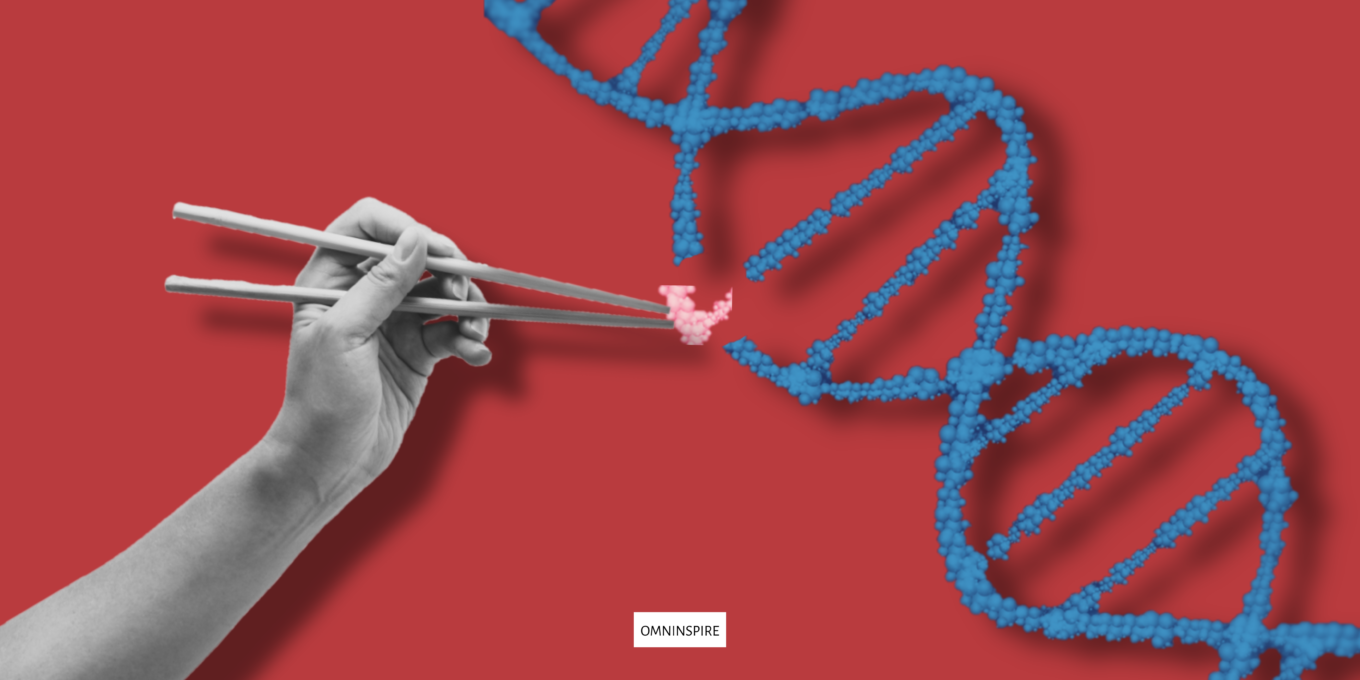Image Source : Freepik
Edited By : OMNINSPIRE
Our DNA is the proof that we humans are all the same and at the same time uniquely different from each other. Our DNA is what makes us..US! It relates us to our past and holds a mirror to our future. Sadly, many people think that our DNA is fixed. It doesn’t change and we get that from our ancestors. This notion is misguided and an easy way out of taking responsibility for our actions in our lifetime.
In simple terms, DNA is like a delicate tryst between fate and tabula rasa. DNA comes with some predefined set of traits and at the same time gives us a chance to treat it as a clean slate to write our own story and pass on better traits to our next generation. And you can make it or break it with your habits and lifestyle.
Aren’t convinced yet to change your lifestyle, so that you can give a better chance at life to your next generation?
Here are some references for you;
If any one of the parents has these below diseases, there are 50% chances that their child can contract them as well.
- Huntington disease ( It is a hereditary brain disorder that leads to progressive deterioration of physical and mental abilities, typically beginning in mid-adult life.)
- Marfan syndrome ( It affects the body’s connective tissue, causing individuals to be tall with long limbs, fingers, and toes, and can lead to various complications involving the heart, eyes, and skeletal system.)
- Neurofibromatosis type 1 ( It is a genetic disorder that causes tumors to form on nerve tissue. It can lead to various complications such as skin changes, tumors along nerves, and potentially affect other organs like the brain and eyes.)
Now, the difficult part is realizing that there is little to nothing that you can do about these diseases. You CANNOT change these mutations in your genes with lifestyle changes. But why put yourself through irresponsible lifestyle habits and debilitating stress that alters your DNA and becomes a bane to your offsprings! Below are the various lifestyle choices that we make everyday without realizing their lasting effects and how you can alter their effects on your DNA.
#1 Excessive Alcohol Consumption
Alcohol consumption has surged over the past decade, with statistics revealing a concerning trend of increased alcohol intake among various age groups and demographics. According to a study, In 2020, India consumed approximately five billion liters of alcohol, with projections indicating an increase to around 6.21 billion liters by 2024. This rise can be linked to various factors, such as the expanding urban population and higher disposable incomes, among other contributing factors.
How Alcohol Affects Our DNA
Excessive alcohol consumption wreaks havoc on DNA through oxidative stress and inflammation. This process overwhelms the body’s antioxidant defenses, damaging DNA strands and impairing repair mechanisms. Consequently, the risk of cancer and other chronic diseases rises significantly.
How to Repair DNA Damage
Repairing DNA damage from alcohol abuse requires moderation and hydration. Limiting alcohol intake to moderate levels and staying hydrated by alternating alcoholic drinks with water supports cellular function and aids DNA repair. Additionally, taking breaks from drinking allows the body time to recover and initiate repair processes, promoting DNA health.
#2 Excessive Sun Exposure
Excessive sun exposure is a common yet often overlooked source of DNA damage. Prolonged exposure to ultraviolet (UV) radiation from the sun can cause direct DNA damage, such as the formation of thymine dimers, which interfere with normal DNA replication and repair processes. Additionally, UV radiation induces the production of harmful free radicals in the skin, leading to oxidative stress and further DNA damage.
How Excessive Sun Exposure Affects Our DNA
UV radiation from the sun directly damages DNA in skin cells, leading to mutations and alterations in DNA structure. This damage increases the risk of skin cancer and accelerates skin aging, impairing the skin’s ability to repair itself.
How to Repair DNA Damage
To repair DNA damage from sun exposure, adopt sun-safe practices like wearing protective clothing, seeking shade, and applying broad-spectrum sunscreen regularly. Antioxidants in skincare can neutralize free radicals generated by UV exposure, supporting DNA repair. Regular skin checks with a dermatologist help detect and address signs of sun-induced damage early, reducing the risk of skin cancer.
#3 Processed Foods

Processed foods, which are high in refined sugars, unhealthy fats, and additives, have become increasingly prevalent in modern diets. These foods often lack essential nutrients and contain harmful substances that can contribute to DNA damage and cellular dysfunction.
How Processed Foods Affects Our DNA
Regular consumption of processed foods can lead to chronic inflammation, oxidative stress, and metabolic imbalances, all contributing to DNA damage. High levels of sugar and unhealthy fats disrupt cellular metabolism, increasing the production of reactive oxygen species (ROS) that damage DNA. Additives and preservatives in processed foods can also directly harm DNA.
How to Repair DNA Damage
Prioritize a diet rich in whole, nutrient-dense foods like fruits, vegetables, lean proteins, and whole grains to support DNA repair mechanisms and protect against oxidative stress. Limit processed foods, sugary snacks, and refined carbohydrates to reduce inflammation and metabolic strain. Stay hydrated, exercise regularly, and manage stress levels to further support DNA repair and maintenance.
#4 Sedentary Lifestyle
In today’s modern society, sedentary behavior has become increasingly common due to technological advancements and changes in lifestyle habits. Prolonged sitting, coupled with minimal physical activity, can have detrimental effects on overall health, including DNA integrity.
How Sedentary Lifestyle Affects Our DNA
A sedentary lifestyle contributes to chronic inflammation, oxidative stress, and impaired DNA repair mechanisms, increasing susceptibility to DNA damage and accelerating cellular aging.
How to Repair DNA Damage
Incorporate regular physical activity into daily routines, aiming for at least 150 minutes of moderate-intensity aerobic exercise or 75 minutes of vigorous-intensity exercise per week, along with muscle-strengthening activities. Break up prolonged sitting with short activity breaks and prioritize enjoyable, sustainable activities to maintain an active lifestyle and support DNA repair.
#5 Environmental Toxins
Exposure to environmental toxins and pollutants is an unavoidable aspect of modern life, with sources ranging from air and water pollution to industrial chemicals and household products. These toxins can have profound effects on DNA integrity and cellular function, contributing to various health problems.
How Environmental Toxins Affect Our DNA
Many environmental toxins are known or suspected carcinogens that can directly damage DNA and disrupt cellular processes. Exposure to air pollutants, such as particulate matter and volatile organic compounds, has been linked to oxidative stress, inflammation, and DNA damage. Additionally, heavy metals like lead, mercury, and cadmium can accumulate in the body over time, causing DNA damage and impairing cellular function.
How to Repair DNA Damage
To protect DNA integrity, improve indoor air quality, choose organic produce, opt for natural cleaning and personal care products, and be mindful of sources of heavy metal exposure. Support initiatives aimed at reducing environmental pollution and promoting sustainable practices for a healthier environment and population.
#6 Smoking and Tobacco Use

Despite widespread awareness of the health risks associated with smoking and tobacco use, these habits remain prevalent in many populations around the world. Tobacco smoke contains thousands of chemicals, including numerous carcinogens and toxins that can cause significant damage to DNA and increase the risk of developing various diseases.
How Smoking Affects Our DNA
The chemicals in tobacco smoke can directly damage DNA by causing mutations, deletions, and other genetic alterations that can lead to the development of cancer and other health problems. Tobacco smoke contains polycyclic aromatic hydrocarbons (PAHs), nitrosamines, and other genotoxic compounds that can induce DNA damage through mechanisms such as DNA adduct formation, oxidative stress, and interference with DNA repair processes.
How to Repair DNA Damage
Quit smoking and avoid tobacco to safeguard DNA integrity. Seek support from healthcare professionals or smoking cessation programs, consider nicotine replacement therapies, and adopt healthy lifestyle habits like regular exercise, balanced diet, stress management, and sufficient sleep to support DNA repair and overall health.
#7 Poor Sleep Habits
In today’s fast-paced society, many people struggle with poor sleep habits due to factors such as work-related stress, electronic device use, irregular sleep schedules, and sleep disorders. Chronic sleep deprivation and poor sleep quality can have far-reaching effects on health, including detrimental effects on DNA integrity and repair processes.
How Poor Sleep Affects Our DNA
Sleep is vital for DNA repair, cellular regeneration, and immune function. Chronic sleep deprivation disrupts these repair processes, leading to increased DNA damage and impaired repair mechanisms.
How to Repair DNA Damage
Prioritize healthy sleep habits by aiming for seven to nine hours of quality sleep each night. Establish a consistent sleep schedule, create a relaxing bedtime routine, and ensure a sleep-friendly environment. Avoid caffeine, nicotine, alcohol, and heavy meals before bedtime to support DNA repair processes and overall well-being.
#8 Poor Diet and Nutritional Deficiencies
A poor diet lacking essential nutrients can significantly impact DNA health and integrity. Processed foods high in sugar, unhealthy fats, and refined carbohydrates contribute to oxidative stress and inflammation, leading to DNA damage. Additionally, deficiencies in key vitamins and minerals, such as vitamin C, vitamin E, selenium, and zinc, can impair DNA repair mechanisms, leaving cells vulnerable to damage and mutation.
How Diet Affects Our DNA
A diet high in processed foods and low in nutrient-dense whole foods deprives the body of essential vitamins, minerals, and antioxidants necessary for maintaining DNA stability and repair. Poor dietary choices contribute to oxidative stress, inflammation, and metabolic dysfunction, all of which can promote DNA damage and impair DNA repair processes. Moreover, nutrient deficiencies compromise the body’s ability to counteract DNA damage, increasing the risk of genetic mutations and chronic diseases.
How to Repair DNA Damage
Focus on consuming a balanced diet rich in whole foods like fruits, vegetables, lean proteins, whole grains, and healthy fats. Limit processed foods and sugary snacks to reduce inflammation and oxidative stress. Stay hydrated and consider supplementing with vitamins and minerals if necessary. Prioritize obtaining nutrients from whole foods to support DNA repair and reduce the risk of associated health issues.
#9 Chronic Stress

Chronic stress, whether from work, relationships, or other life circumstances, can take a toll on physical and mental well-being, including DNA health. Prolonged exposure to stress triggers a cascade of physiological responses, including hormonal changes, inflammation, and oxidative stress, which can damage DNA and compromise repair mechanisms.
How Stress Affects Our DNA
Chronic stress activates the body’s stress response system, leading to the release of stress hormones like cortisol and adrenaline. Elevated levels of these hormones can disrupt cellular processes, increase oxidative stress, and impair DNA repair mechanisms, contributing to DNA damage and genomic instability. Additionally, chronic stress promotes inflammation and immune dysregulation, further exacerbating DNA damage and dysfunction. Over time, accumulated DNA damage from chronic stress can increase the risk of various health conditions, including cardiovascular disease, cancer, and neurodegenerative disorders.
How to Repair DNA Damage
To mitigate the effects of chronic stress on DNA health, prioritize stress management techniques and self-care practices. Engage in regular physical activity, such as exercise or yoga, to help reduce stress hormones and promote relaxation. Practice mindfulness meditation, deep breathing exercises, or progressive muscle relaxation to calm the mind and body and alleviate stress-related symptoms. Establish healthy boundaries and prioritize self-care activities that bring joy and fulfillment. Seek social support from friends, family, or a therapist to process emotions and cope with stressors effectively. Prioritize adequate sleep, nutrition, and hydration to support overall resilience and well-being. By adopting stress-reducing strategies and prioritizing self-care, you can protect DNA health and enhance your resilience to stressors.
#10 Unprotected Exposure to Radiation
Unprotected exposure to radiation from various sources, including medical procedures, environmental factors, and technological devices, poses a significant risk to DNA integrity and stability. Radiation can cause direct DNA damage by breaking chemical bonds within the DNA molecule or indirectly by generating reactive oxygen species that induce oxidative stress and DNA lesions.
How Radiation Exposure Affects Our DNA
Ionizing radiation, like X-rays and gamma rays, directly damages DNA, causing breaks and mutations. Non-ionizing radiation, such as UV light and EMFs, induces oxidative stress, leading to DNA damage and an increased risk of cancer.
How to Repair DNA Damage
Discuss the necessity and risks of medical imaging with your healthcare provider, opting for lower radiation doses when possible. Use protective equipment during medical procedures and limit exposure to sunlight and electronic device radiation. Wear protective clothing, sunscreen, and use shielding to minimize radiation exposure. By taking these precautions, you can safeguard DNA integrity and reduce the risk of radiation-induced damage.
A humble reminder here would be to keep in mind that these ‘How To Repair Your DNA’ are not something that you do for a few days and expect to see changes for life. These are lifestyle changes that you need to keep at consistently to keep your DNA healthy for the next generations to reap benefits.
It is not just socio-Economic status that you can make better for your kids but also their DNA!







